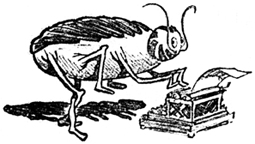Hope Don’t Gurgle: Don Marquis and Prohibition
Don Marquis was not only a humorist, author, poet and playwright, but from the 1910s into the mid-‘30s he was also perhaps the most popular and widely-quoted daily newspaper columnist in New York City. First at the Evening Sun and later at the Tribune, Marquis was known for his genial wit, his amusing poems, and for poking (usually) gentle fun at human foibles, city life, politics, religion, and the general state of things. Beneath the quips, however, was a deep, healthy skepticism and a disdain for hypocrisy and foolishness. As he himself once said, (and I’m paraphrasing here) “a humorist is someone who breaks the bad news gently.” The passage of the 18th Amendment gave him more than enough material to work with.
While not a heavy drinker by any means—certainly not compared to most of his contemporaries in the newspaper business—Marquis had nothing against the habit, and was not one to turn up his nose at the occasional double scotch. As he once penned in one of his famous bits of light verse:
If all the water on the globe
Should turn to beer and ale
I’d cast conventions to the wind
And play I was a whale
Working to his advantage here, Marquis’s columns were populated by a Runyonesque cast of (fictional) eccentrics, flim-flam men, and the occasional cat and cockroach, who sometimes spoke in verse giving Marquis poetic license (literally) to make some very pointed comments about what was happening in the world. Among the most popular of his characters was Clem Hawley, aka The Old Soak, a wise and drunken crackerbarrel philosopher.
Although introduced beforehand, it was after Prohibition became the law of the land in 1920 that The Old Soak became a star, even a hero. He was the focus of a couple of Marquis’s books as well as a popular stage play, a less popular sequel, a radio play, and two Hollywood films. It’s amazing nowadays to think a drunk thumbing his nose at The System could become such an iconic pop culture figure in the midst of Prohibition, but he was an invaluable commentator on just how foolish the whole fiasco was.
“I see that some persons think there is still hope for a liberal interpretation of the law so that beer and light wines may be sold,” said we.
“Hope,” said he, moodily, “is a fine thing, but it don’t gurgle none when you pour it out of a bottle. Hope is all right, and so is Faith … but what I would like to see is a little Charity.
“As far as Hope is concerned, I’d rather have Despair combined with a case of Bourbon liquor than all the Hope in the world by itself.”
The Old Soak was so popular, in fact, that he remained a regular among Marquis’s cast of characters even after Prohibition was repealed. Sometimes, regardless of the situation, you can only count on a drunk to tell you the truth.
It wasn’t just through The Old Soak that Marquis saw fit to comment on Prohibition. Assorted quips found their way into other books, columns, and poems as well. Even archy, the cockroach in his famed “archy and mehitabel” series had a few choice observations to make. After all, we were living in a nation in which ordinary citizens suddenly had to creep around like sneak thieves to get a drink, where organized crime was flourishing, where people were being beaten and shot and arrested—all over the inalienable human right to get properly sloshed on bathtub rye. There may have been an upside to it, however, as Marquis writes:
“Drinking used to be a mighty commonplace matter; but Prohibition has brought a smack of adventure into it that makes it really enjoyable.”
In retrospect, it’s highly unlikely that Don Marquis’s writing had anything to do with the 1933 repeal of Prohibition (all the killing and mayhem probably played a bigger role). And if you think about it, given how much material it provided him there’s some question as to whether he would’ve repealed Prohibition were it in his power. But by speaking honestly, bluntly, and with humor and a deep understanding of human nature, he certainly made that thirteen year mess a little more entertaining for everyone who read him.
So let’s close with one of my favorite of his limericks, which remains true for any era:
There was a young fellow named Sidney
Who drank till he ruined his kidney
It shriveled and shrank as he sat there and drank
But he had a good time of it, didn’e?
(Quotations courtesy of
By Jim Knipfel

